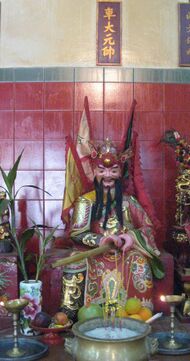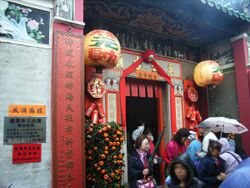Religion:Che Kung
Che Kung (Chinese: 車公; pinyin: Chēgōng; literally: 'Lord Che') (02 January, 1235-30 December, 1330), also known as Che Da Yuan Shuai (車大元帥; 'Che, the Great Warrior'), was originally a military commander of Southern Song Dynasty (1127–1279), who, according to lore, had supreme power to suppress rebellion and was renowned for his loyalty to the Emperor.[1] He was also famous for his power to suppress plagues and his skill in medicine.[2] He is believed by some worshipers to have been involved in the attempt to keep the Song state alive by bringing Prince Ping and his brother to the South.[3] He is now considered the God of Protection.
Life
Che Kung was a native of Nanchang, in Jiangxi Province of China .[1] As a military commander, he saved the southern regions of China from destruction and disorder. Also, he appeared in many villagers dreams who were suffering from a plague at that time. After the plague was over, the villagers believed that Che Kung had miraculously saved them from the terrible plague. Taoists regarded him as a Deity due to his miracles and blessings. Inside a temple of Che Kung, pinwheels can always be found next to his effigy. It is believed that the one who rotates the pinwheel at a certain direction can receive good luck. The Birthday of Che Kung is the second day of Chinese New Year, though often celebrated on the third.
See also
- The Birthday of Che Kung: a celebration dedicated to Che Kung
- Che Kung Miu: temples dedicated to Che Kung (located in Sha Tin & Sai Kung)
- I Shing Temple, dedicated to Hung Shing and Che Kung
- Hong Kong Government Lunar New Year kau chim tradition
References
External links
 |



